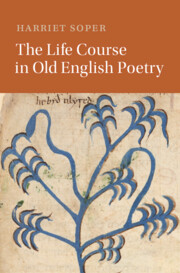Book contents
- The Life Course in Old English Poetry
- Cambridge Studies In Medieval Literature
- The Life Course in Old English Poetry
- Copyright page
- Dedication
- Contents
- Figures and Tables
- Acknowledgements
- A Note on the Chronology of Old English Poetry
- Abbreviations
- Introduction The Poetics of the Life Course
- Chapter 1 Taking Shape
- Chapter 2 Becoming Useful
- Chapter 3 Outliving Others
- Chapter 4 Getting Wasted
- Conclusion The Rhyming Poem
- Notes
- Bibliography
- Index
- Cambridge Studies in Medieval Literature
Chapter 4 - Getting Wasted
Deathly Conditions in Wisdom Catalogues and Doomsday Poetry
Published online by Cambridge University Press: 29 November 2023
- The Life Course in Old English Poetry
- Cambridge Studies In Medieval Literature
- The Life Course in Old English Poetry
- Copyright page
- Dedication
- Contents
- Figures and Tables
- Acknowledgements
- A Note on the Chronology of Old English Poetry
- Abbreviations
- Introduction The Poetics of the Life Course
- Chapter 1 Taking Shape
- Chapter 2 Becoming Useful
- Chapter 3 Outliving Others
- Chapter 4 Getting Wasted
- Conclusion The Rhyming Poem
- Notes
- Bibliography
- Index
- Cambridge Studies in Medieval Literature
Summary
Old English poems frequently present death and deathlike states as synonymous with a loss of strength and social usefulness. Given the omnipresence of death in the corpus, this chapter explores a broader range of texts than previous chapters, but it focuses particularly on poems concerned with cosmic order and disorder: wisdom catalogues – including The Fortunes of Men, Maxims I and II, and Solomon and Saturn II – and poetry on Doomsday, especially Christ in Judgement and Judgement Day II. All these texts suggest death’s resemblance to dormant physical states which ostensibly belong to the living, such as sleep and drunkenness, attributing a strangely lively quality to the condition of death itself. Death emerges as a true part of the life course, not purely in terms of continued social identity, but continued embodied experience – physically, it is marked by the kind of restriction and uselessness which accompany sleep and drunkenness, suggesting a kind of spectrum of usefulness and wastefulness which cuts across life and death.
Keywords
- Type
- Chapter
- Information
- The Life Course in Old English Poetry , pp. 137 - 173Publisher: Cambridge University PressPrint publication year: 2023

